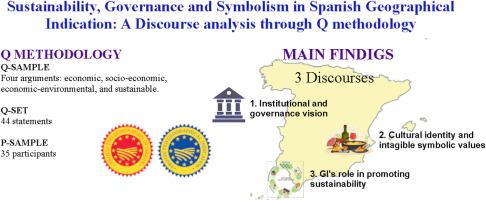西班牙地理标志中的可持续性、治理与象征:基于Q方法论的话语分析
IF 5.7
1区 社会学
Q1 GEOGRAPHY
引用次数: 0
摘要
地理标志旨在提供与特定地理特征、保护自然资源以及保护文化和烹饪习俗相关的差异化独特产品。地理标志的扩展也产生了越来越多的文献,旨在从不同的角度和使用不同的方法方法来研究它们。然而,很少有研究优先考虑不同的观点或探索这些互补观点之间是否存在共识。解决这一不足是本研究的目的。方法框架以Q方法论为基础,通过因子分析将定量成分与专家意见的定性成分相结合。参与这项研究的专家被要求在一系列与被分析主题相关的刺激中定位自己。本研究选择的刺激是基于对文献的全面审查,产生44个声明供专家评估。结果使我们能够确定关于地理标志的三个主要话语。第一个旨在强调制度和治理方面,第二个侧重于认证产品及其无形的象征价值,而第三个强调它们在促进保护区内和地理标志区域成员之间的可持续性方面的作用。本文章由计算机程序翻译,如有差异,请以英文原文为准。

Sustainability, governance and symbolism in Spanish geographical indication: A discourse analysis through Q methodology
Geographical indications (GIs) aim to offer differentiated unique products associated with a specific geographical identity, the conservation of natural resources, and the safeguarding of cultural and culinary customs. The expansion of GIs has also generated an increasing literature aimed at examining them from various perspectives and using diverse methodological approaches. However, there is a paucity of research that prioritises the different viewpoints or explores the presence of consensus among these complementary perspectives. Addressing this lack is the objective of this study. The methodological framework is based on Q methodology, which integrates quantitative components through factor analysis and qualitative components through expert opinions. The experts involved in this research were asked to position themselves on a series of stimuli related to the topic being analysed. The stimuli chosen for this study were based on a comprehensive review of the literature, resulting in 44 statements for experts to evaluate. The results have allowed us to identify three primary discourses regarding GIs. The first aims to emphasise the institutional and governance aspects, the second focuses on the certified products and its intangible symbolic values while the third emphasises their role in promoting sustainability within the protected region and among GI region members.
求助全文
通过发布文献求助,成功后即可免费获取论文全文。
去求助
来源期刊

Journal of Rural Studies
Multiple-
CiteScore
9.80
自引率
9.80%
发文量
286
期刊介绍:
The Journal of Rural Studies publishes research articles relating to such rural issues as society, demography, housing, employment, transport, services, land-use, recreation, agriculture and conservation. The focus is on those areas encompassing extensive land-use, with small-scale and diffuse settlement patterns and communities linked into the surrounding landscape and milieux. Particular emphasis will be given to aspects of planning policy and management. The journal is international and interdisciplinary in scope and content.
 求助内容:
求助内容: 应助结果提醒方式:
应助结果提醒方式:


